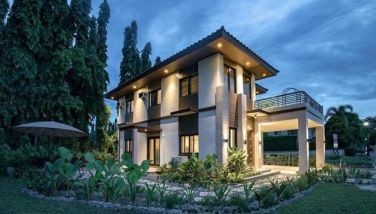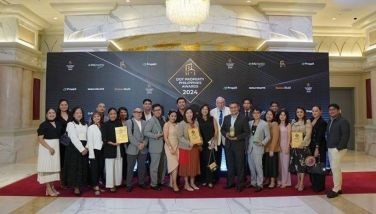Glasswool makes perfect insulation sense
May 20, 2001 | 12:00am
Distributors of so-called insulation products such as reflective aluminum sheets with air bubble layer and the plastic-backed PE foam are taking advantage of the hot summer season to sell their unproven merchandise to unsuspecting consumers, even going to the extent of providing the public with false information on legitimate insulation materials such as glasswool. A consumer when confronted with this kind confusion, needs only to exercise his common sense to arrive at a correct decision. More imperatively so if he believes that his hard-earned money deserves something of equal value.
Because no salesman would speak ill of his product, the first thing that a potential buyer should find out is: Who will guarantee this products claim? While both the reflective aluminum sheets and the PE foam are claimed by their distributors to have high insulation value, they do so without the benefit of controlled laboratory tests in the presence of independent bodies. To boost credibility, an aluminum sheet distributor has even gone to the extent of inviting mall-goers to an uncontrolled comparative testing between its reflective beamed light while the latter did not.
However, they knowingly hid the fact that reflective insulation works only in conjunction with an air space. When installed between the roof and the purlins, the aluminum sheet barely has a few inches of air space to work with and very little light to reflect in the first place. Because the consumer does not get what he is made to believe he will, he is practically robbed of his money. On the other hand, Glasswool, made by Asia Pacific Insulation Corporation (APIC) and sold under the brand names Flexicool, Econoroll and Building Blanket, has a high insulation value as tested under laboratory conditions. In fact, it has the quality approval of ISO 9002, UL and ASTM among others. Glasswool works by trapping heat and preventing it from penetrating to the house’s interior – the very concept of insulation.
Another simple question that a consumer needs to ask is: What kind of reputation does the product and its distributor enjoy? The aluminum sheet with air bubble layer has been in existence for quite some time now yet not as a home insulation but as a car interior reflective cover. It is only recently that it has been marketed as a residential product. The PE foam meanwhile is a ball of fire waiting to happen. Made from oil-based low density polyethylene resin, the PE foam, because of its closed-cell structure, is more suited for cold applications than as an insulation against heat. On the contrary, Glasswool, for decades, is more suited for cold applications than as an insulation against heat. On the contrary, Glasswool, for decades, is being used all over the world as a top-of-the-line insulation material. APIC, A local manufacturer of glasswool has enjoyed the reputation of quality and credibility for more than 25 years.
Because no salesman would speak ill of his product, the first thing that a potential buyer should find out is: Who will guarantee this products claim? While both the reflective aluminum sheets and the PE foam are claimed by their distributors to have high insulation value, they do so without the benefit of controlled laboratory tests in the presence of independent bodies. To boost credibility, an aluminum sheet distributor has even gone to the extent of inviting mall-goers to an uncontrolled comparative testing between its reflective beamed light while the latter did not.
However, they knowingly hid the fact that reflective insulation works only in conjunction with an air space. When installed between the roof and the purlins, the aluminum sheet barely has a few inches of air space to work with and very little light to reflect in the first place. Because the consumer does not get what he is made to believe he will, he is practically robbed of his money. On the other hand, Glasswool, made by Asia Pacific Insulation Corporation (APIC) and sold under the brand names Flexicool, Econoroll and Building Blanket, has a high insulation value as tested under laboratory conditions. In fact, it has the quality approval of ISO 9002, UL and ASTM among others. Glasswool works by trapping heat and preventing it from penetrating to the house’s interior – the very concept of insulation.
Another simple question that a consumer needs to ask is: What kind of reputation does the product and its distributor enjoy? The aluminum sheet with air bubble layer has been in existence for quite some time now yet not as a home insulation but as a car interior reflective cover. It is only recently that it has been marketed as a residential product. The PE foam meanwhile is a ball of fire waiting to happen. Made from oil-based low density polyethylene resin, the PE foam, because of its closed-cell structure, is more suited for cold applications than as an insulation against heat. On the contrary, Glasswool, for decades, is more suited for cold applications than as an insulation against heat. On the contrary, Glasswool, for decades, is being used all over the world as a top-of-the-line insulation material. APIC, A local manufacturer of glasswool has enjoyed the reputation of quality and credibility for more than 25 years.
BrandSpace Articles
<
>
- Latest
Latest
Latest
October 23, 2024 - 9:30am
By May Dedicatoria | October 23, 2024 - 9:30am
October 11, 2024 - 3:45pm
October 11, 2024 - 3:45pm
October 10, 2024 - 11:30am
October 10, 2024 - 11:30am
October 5, 2024 - 12:08pm
October 5, 2024 - 12:08pm
September 24, 2024 - 1:00pm
September 24, 2024 - 1:00pm
September 13, 2024 - 4:00pm
September 13, 2024 - 4:00pm
Recommended




























